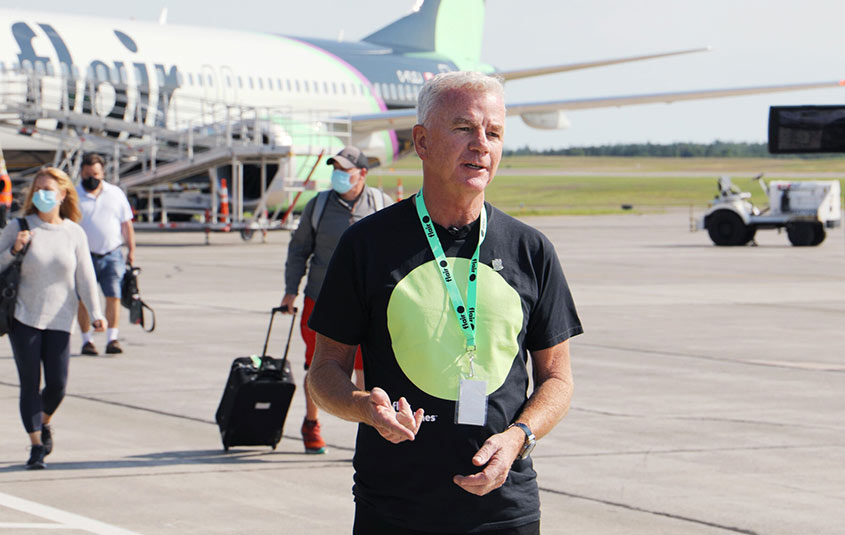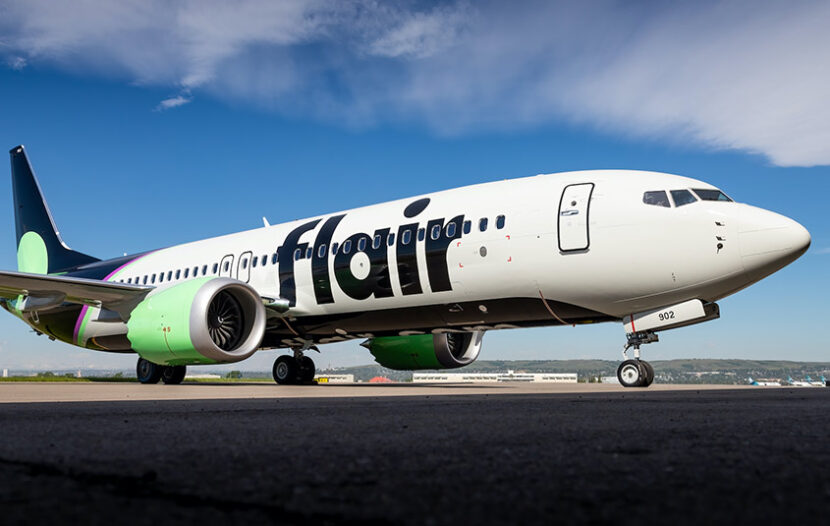TORONTO — Flair Airlines’ President and CEO Stephen Jones says travellers can continue to book flights with the ultra low-cost carrier, because “Flair Airlines is here to stay.”
Jones spoke at a press conference yesterday to address speculation about the outcome of the Canadian Transportation Agency’s ongoing review of Flair.
Ultra-low cost carriers aren’t known for working with travel agents, and with their streamlined cost model, very few offer commission. For that reason ULCCs don’t get a lot of notice from the travel trade.
But in recent weeks some industry watchers have been wondering about the airline’s future after the CTA’s review called Flair’s ownership into question.
Foreign ownership in Canadian airlines can’t be higher than 49%. That percentage drops to 25% if the foreign investment is from one individual. There are also rules around foreign interests controlling a Canadian carrier.
777 Partners, based in Miami, owns 25% of Flair, plus has seats on its board, and leases a number of aircraft to Flair.
The CTA’s preliminary determination, submitted March 3, noted that Flair may not meet Canada’s requirements for Canadian ownership. After Flair was given 60 days to respond, reports followed that Flair could lose its license to operate in Canada by May 3.

Flair Airlines President and CEO Stephen Jones at Edmonton International Airport, August 2021
“The May 3 deadline that’s been widely reported in the media is not a drop-dead date. May 3 is simply the date by which Flair needs to respond to the CTA on the concerns they’ve raised in their preliminary determination. There is zero chance that Flair will lose its license on May 3,” Jones said yesterday.
“Flair is a Canadian airline, full stop,” he added. He said Flair “exists to bring affordable travel to all Canadians. Because for too long Canadian aviation has been dominated by two carriers. It should not cost $800 to fly one-way on a two hour flight within Canada. It should not be cheaper to fly to Europe than to fly within our own country. That’s just wrong. But that’s the current Canadian reality due to a lack of real competition in the market. The lockdown of Canadian consumers had been happening long before COVID-19.”
TRADE HAS SEEN LOW-COST CARRIERS COME AND GO
Over the years the Canadian travel trade has seen airlines come and go, particularly ULCCs and LCCs, from Jetsgo to the short-lived Greyhound Air and many, many more.
And Flair is just one of several Canadian airlines battling it out for more market share in the months ahead. New-on-the-scene ULCC Lynx Air launched earlier this month. Start-up Canadian Jetlines, while not a low-cost carrier, is also determined to win over passengers with flights scheduled to start this summer. And Air Canada and Air Canada Rouge, WestJet and Swoop, Transat, Sunwing, Porter Airlines (with expansion plans of its own) and more ensure plenty of choice for Canadian travellers.
The travel trade has also seen what overcapacity can do to pricing, with a race to the bottom. As all of Canada’s airlines fully ramp back up to pre-pandemic capacity levels, this is “the calm before the storm”, as one aviation expert put it in a Feb. 2022 interview with Travelweek.
Jones says Flair will have 20 aircraft by this summer, with 650 flights per week on sale to 20 Canadian cities.
Flair has also expanded with flights into the U.S. and Mexico.
NO GOVT. BAILOUT MONEY DURING PANDEMIC, BUT DEBT TO 777 PARTNERS
Addressing the reports about the review, Jones noted that the CTA is looking for three things. First, companies must be demonstrably owned and operated by Canadians. Second, 50% or more of voting shares must be owned by Canadians.
And third, there’s the ‘control in fact’ test. Basically, the CTA determines whether or not a company is essentially under Canadian control. It’s a subjective test to ensure that any involvement by non-Canadian stakeholders isn’t “dominant and determining in nature.”
In its March 3 findings, the CTA called out Flair’s depth of relationship with 777 Partners, largely stemming from Flair’s debt to 777 in the wake of the pandemic, says Jones.
Jones wouldn’t put a number on Flair’s debt to 777, except to say that “it’s a significant amount.” Flair, like airlines around the world, faced extreme challenges over the past two years. Flair also didn’t receive the pandemic financing from the Canadian government that Canada’s other major airlines got, said Jones.
“Flair wasn’t part of the billions in bailout funding” that was provided to many of Canada’s airlines, he added. “Instead we turned to our shareholders to survive, and 777 Partners provided a lifeline to protect thousands of jobs from coast to coast.”
Jones said 777 Partners “has never used the fact that they were providing cash to exert day-to-day control.”
He said that Flair has so far refinanced millions of dollars of its debt to 777 Partners, but adds that the refinancing of the balance of the debt “will take some time. It is for this reason alone that we have sought an 18-month exemption” to Canadian ownership requirements under the Canada Transportation Act.
As reported earlier this week, the NACC, which includes Air Canada, WestJet and Air Transat, along with ATAC have voiced their strong opposition to Flair’s 18-month exemption request. “Domestic control and ownership is not just a ‘nice to have’, it is a necessary underpinning of the system, and should be defended,” said the NACC in an April 19 statement.
Flair will respond to the CTA by May 3, said Jones.
In response to a question from the media, Jones said that as Flair works to rectify the CTA’s corporate governance concerns, and given that the airline is cash self-sufficient, “the only thing that will remain is the fact that we owe some debt to a shareholder (777 Partners) who provided it to enable us to survive COVID. And all we’re really asking for is time to refinance that debt. And the CTA will form a view on that.”

